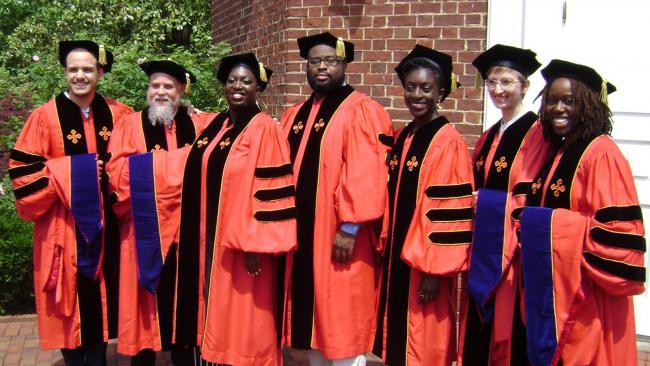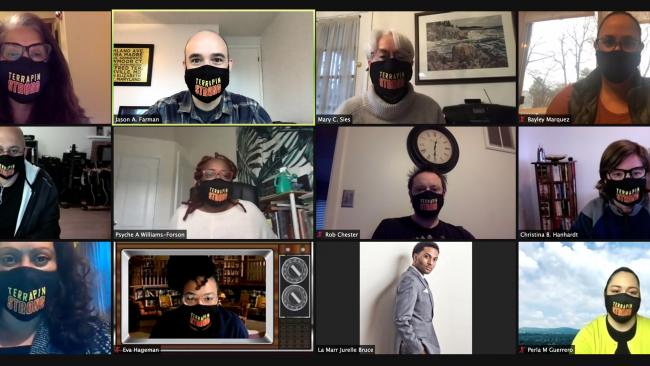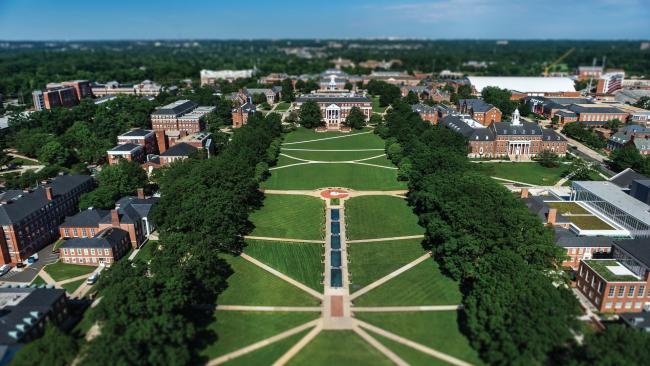Graduate Program
The department seeks to promote understanding of the complex nature of American life and culture through examining how individual experience intersects with local, national and global contexts.
In investigating issues such as identity, difference, representation, power and cultural and historical change, the department encourages the study of national, regional and local communities, and supports research focused within both contemporary and historical contexts.
The department offers students the opportunity to apply American studies theory and method to their own areas of research, while encouraging them to draw on the approaches of related disciplines in order to inform and enrich their work. In addition to 12 American studies department faculty, the program also provides students with access to a network of approximately 70 affiliate faculty from departments such as African American studies, anthropology, architecture, English, history, sociology and women, gender and sexuality studies. Regular departmental, core affiliate and affiliate faculty members are all eligible to direct dissertations and theses and to serve as advisors to graduate students in American studies.
Our connections with a wide variety of faculty from departments across campus offer American studies students a chance to take part in projects such as the Consortium on Race, Gender, and Ethnicity (CRGE), the David C. Driskell Center for the Study of the Arts and Culture of African Americans and the African Diaspora, or the Maryland Institute for Technology in the Humanities (MITH), attend joint-sponsored lecture series and polyseminars and engage in a dialogue with the broader community of Americanists on campus. The Department of American Studies also offers students the opportunity to receive certificates in programs such as digital studies, historic preservation, the joint University of Maryland/Smithsonian Institution Program in Museum Scholarship and Material Culture and women, gender and sexuality studies. Students can also make use of the extensive resources housed in the Smithsonian Institution, the National Archives, the Library of Congress and other museums, libraries and government agencies in the Baltimore-Washington, D.C. region.
The department is committed to supporting excellence and originality in scholarly research. It also seeks to foster community and professional relationships and encourage regional and national scholarly exchange through student and faculty participation in conferences, projects and workshops and through the publication of scholarly work.
Graduate students enter the program with a variety of skills, research interests, backgrounds and professional experience. Whether focused on careers in the academy, advocacy and public policy, government, media or cultural resource management, students find a community of scholars engaged with teaching and research and resources designed to complement their specific interests and goals and to develop their academic skills.
To apply, please visit the Graduate School’s Online Application and make sure to forward the necessary materials directly to the Graduate School.
For more information about the graduate Ph.D. or master’s programs, contact the AMST Director of Graduate Studies, Dr. Bayley J. Marquez
AMST By the Numbers

98% PH.D. STUDENT PLACEMENT

13 CORE FACULTY
Small, Intimate Department

75+ AFFILIATE FACULTY
University-Wide Partnerships
Director of Graduate Studies
Bayley Marquez
Associate Professor, Director of Graduate Studies, American Studies
3324 Tawes Hall
College Park
MD,
20742
Resources for Graduate Students
Off-Campus Research Resources
Library of Congress: Internationally renowned for its extensive collections, including collections of printed materials, prints, maps, photographs, sound recordings and film.
National Archives and Records Administration: NARA houses collections at various sites around the metro Washington, D.C. area and includes the state-of-the-art research facility Archives II in College Park, just minutes from the UMCP campus.
Smithsonian Institution Libraries: Includes those of the African Art Museum; National Gallery of Art; National Museum of American History, which includes the Office of American Folklife; the National Portrait Gallery; and the National Museum of American Art’s Archives of American Art, the world’s largest repository for primary source material documenting the history of the visual arts in the United States.
Other Area Resources
American Institute of Architects
National Building Museum, Archives and Collections
Enoch Pratt Free Library, Baltimore
Archaeological Society of Maryland, Inc
Merrill Learning Center and Deaf Archives, Gallaudet University
Moorland-Spingarn Resource Center, Howard University: one of the largest repositories of African American historical documents in the area
The Martin Luther King Jr. Memorial Library
University of Virginia collections
The US Army Center of Military History
US Government Libraries, including those of the federal departments of Labor, Housing and Urban Development, Commerce, and Interior
Campus Resources
The libraries on the College Park campus, consisting of the Theodore H. McKeldin library and six branch libraries, contain over 2.2 million volumes and subscribe to about 20,000 periodicals and newspapers. Additional collections of research materials are available on microfilm, microfiche, phonograph records, tapes, films and in electronic formats. Research at College Park is supported by a variety of technological tools. An online catalog identifies library materials from the collections of libraries on all campuses of the University of Maryland system. It provides access to information about articles in over 100,000 journals and through the fee-based CARS system for accessing hundreds of remote databases, as well as through the free use of over 60 automated reference tools in the library. Extensive inter-library loan services are available to obtain loans or photocopies of materials from other libraries not available at College Park.
Libraries and Collections at UMCP
Architecture Library; Art Library; Broadcast Pioneers and Public Broadcasting Collections; Maryland Room; Non Print Media Library; Performing Arts Library; and the National Trust for Historic Preservation Library, the largest preservation library in the United States.
Other Resources at UMCP
Our connections with a wide variety of faculty from departments across campus offer American studies students a chance to take part in projects such as the Consortium on Race, Gender, and Ethnicity (CRGE), the Maryland Institute for Technology in the Humanities (MITH) and the Center for Heritage Resource Studies, attend joint-sponsored lecture series and polyseminars and engage in a dialogue with the broader community of Americanists on campus.

